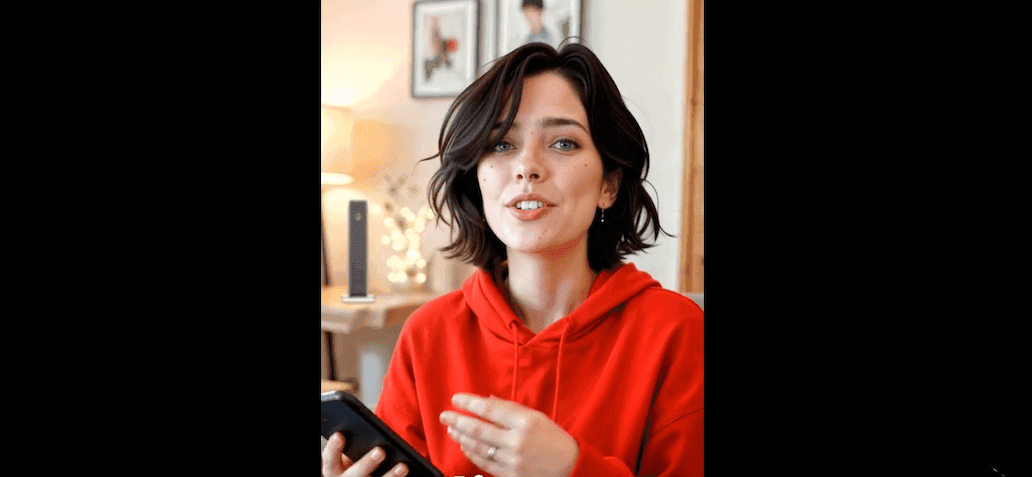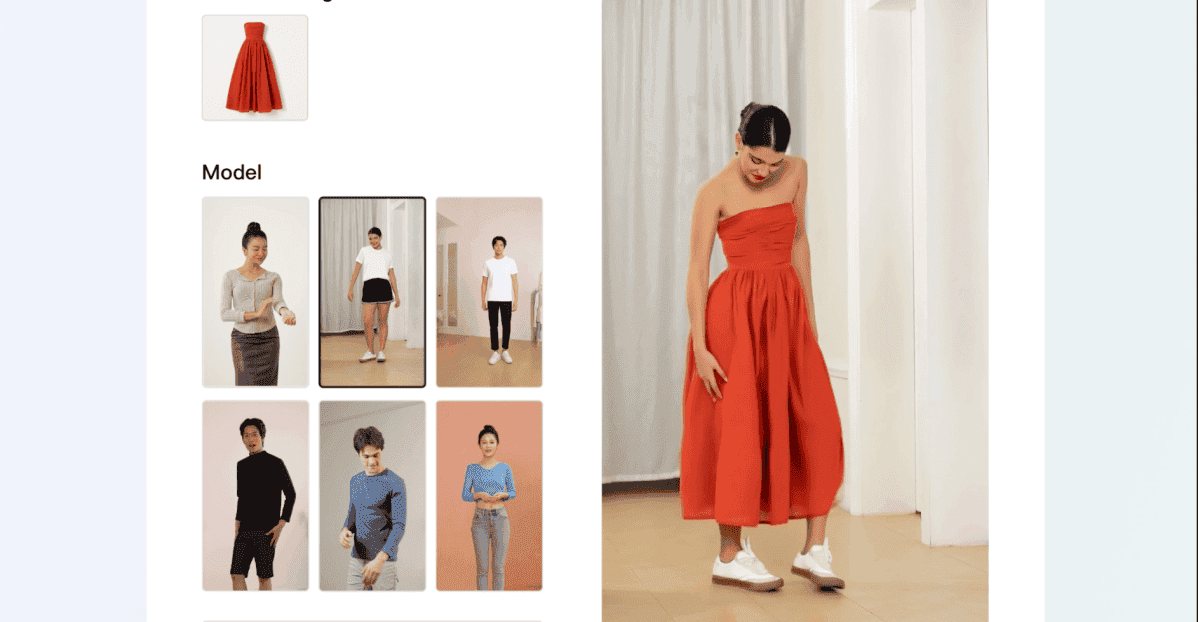Vodafone Tests AI-Generated Spokesperson in New Advertising Campaign
4 Sources
4 Sources
[1]
Creepy or Fun? Vodafone's New Spokesperson Is AI, Not a Real Person
The company says it's testing out different types of advertising, including an AI character who has appeared in social-media ads. British telecoms company Vodafone is testing out a new spokesperson, a red-hoodied woman who speaks German and touts the benefit of high-speed home internet services. One important note about this influencer: she's AI-generated. The character appears in a TikTok video posted three times on Vodafone's official account and collectively, the videos have received more than two million views. According to The Verge, the video has also appeared as advertisements on X. In responses to comments on the videos, the company said the spokesperson was part of various advertising tests it's conducting. In one response from the company's social-media team, translated from German, Vodafone said: "we're trying out different styles -- AI is so much a part of everyday life now that we're trying it out in advertising too." A spokesperson (AI or otherwise) for Vodafone did not immediately return an email about the AI advertising. Just last month, transportation company ScotRail reversed a decision to use an AI-generated voice on its trains after complaints.
[2]
The influencer in this AI Vodafone ad isn't real
I opened TikTok while visiting Germany last week and stumbled across a Vodafone ad being presented by a woman who probably doesn't exist. The ad includes several "tells" that suggest the presenter was artificially created using generative AI -- the unnatural style and movement of her hair, the way her moles disappear, and the uncanny valley vibe of her facial expressions -- and Vodafone confirmed my suspicions in its video comments. In response to a commenter asking why Vodafone couldn't put "a real person in front of the camera," the company said it was "testing different styles of advertising -- this time with AI," according to machine translation of the German text. In another comment, Vodafone said that "AI is so much a part of everyday life these days that we also try it out in advertising." As an ad, it certainly captured my attention, but only because my brain registered that there was something "off." This isn't the first time that Vodafone has embraced generative AI in its ads, having released a commercial last year in which every shot was AI-generated. Fake influencers created using artificial intelligence are also rising in popularity, according to a New York Times report, with notable examples like Lil' Miquela -- a creation of tech company Dapper Labs -- having already appeared in campaigns for Calvin Klein, Prada, and BMW.
[3]
Vodafone is testing an AI 'actor' to sell its products instead of paying a human to do it
Vodafone made a commercial starring an AI avatar posing as a real lady. This is interesting because Vodafone is a major global brand and not a fly-by-night TikTok company using a ridiculous deepfake of Jackson Galaxy to sell cat toys. The tells in the commercial are obvious and what one would expect. The AI avatar's hair is a bit off, which ruins the charade that this is a real person. The physical mannerisms and speaking tone are also wonky. A facial mole moves around at one point. It's AI. You know the drill. The company responded to a question on a message board as to why it couldn't put "a real person in front of the camera" by saying this is simply an experiment. It said it was "testing different styles of advertising -- this time with AI," and that "AI is so much a part of everyday life these days that we also try it out in advertising." This isn't the first Vodafone ad to feature generative AI. It released a fully AI-generated commercial last year that spurred a bit of controversy, despite looking absolutely awful. Social media platforms are also becoming increasingly littered with AI-generated virtual influencers.
[4]
Vodafone's new ad proves even influencers can be replaced by AI
British telecom company Vodafone is testing the limits of technology by using an AI influencer in its advertisements. In a video uploaded to the TikTok account of its German subsidiary, a young brunette woman can be seen talking up the company's connectivity speeds and a 120-euro cashback promotion. Yet, the woman doesn't really exist. In reply to a user who picked up on the telltale signs of AI, including the disappearing and reappearing moles on her chin, the company noted that it was experimenting with the technology. "...we're trying out different styles -- as AI is now such a big part of everyday life, people are experimenting with it in advertising too," the company responded in German. The telecom company has in the past experimented with using AI in advertisements, including in an advertisement "The Rhythm of Life," published last year. The advertisement started with a birth followed by miscellaneous images of a child playing video games, a person skydiving, and a wedding intertwined with Vodafone branding. The ad was "100% AI-produced without a single real pixel," Vodafone's global senior brand identity and communications manager Amr El Badry told Ad Age in December 2024. Vodafone did not immediately respond to Fortune's request for comment. Vodafone's most recent TikTok experiment comes as AI influencers become more commonplace. One AI influencer, Lil Miquela, has 2.4 million followers and charges $73,920 per post, according to The New York Times. Lil Miquela has taken selfies with former House Speaker Nancy Pelosi (D-Calif.), has attended the VMAs, and complains on her Instagram about deepfakes of her proliferating online. In the background, the influencer is controlled by a team of people at tech company Dapper Labs. Influencers are among the most recent jobs being challenged by AI. Recent studies have shown entry-level positions especially vulnerable to automation are being scaled back thanks to AI. A Stanford University study published last month found early-career workers in these fields have experienced a 13% decline in relative employment. Even some of the people who helped create the technology for this latest AI-driven work revolution have warned about the potential for displacement. Anthropic CEO Dario Amodei earlier this year made waves by predicting AI would eliminate half of all entry-level, white-collar jobs. The "Godfather of AI" Geoffrey Hinton told the Financial Times "rich people are going to use AI to replace workers," leading to a huge unemployment spike and record profits. Even Bill Gates, who has been generally optimistic on AI and encouraged Gen Z workers to experiment with it, said being experienced with AI may not prevent job displacement.
Share
Share
Copy Link
Vodafone, a major telecom company, is experimenting with an AI-generated spokesperson in its latest advertising campaign, sparking discussions about the future of influencer marketing and AI's role in advertising.
Vodafone's AI Spokesperson Debut
British telecommunications giant Vodafone has taken a bold step into the future of advertising by introducing an AI-generated spokesperson in its latest campaign. The company's German subsidiary recently posted a TikTok video featuring a young brunette woman promoting Vodafone's high-speed internet services and a cashback offer
1
. This move has sparked discussions about the increasing role of artificial intelligence in marketing and its potential impact on human influencers.
Source: CNET
The AI Spokesperson: Uncanny Valley or Marketing Innovation?
The AI-generated character, dressed in a red hoodie and speaking German, has appeared in multiple TikTok videos on Vodafone's official account, collectively garnering over two million views
1
. The videos have also been used as advertisements on X (formerly Twitter). However, keen observers have noticed several "tells" that suggest the presenter is not a real person:- Unnatural hair movement and style
- Disappearing and reappearing moles
- Uncanny valley-like facial expressions
2
These imperfections have led to mixed reactions from viewers, with some finding the AI spokesperson intriguing, while others describe it as "creepy" or "off"
3
.Vodafone's Stance on AI in Advertising
In response to user comments, Vodafone's social media team explained that they are "testing different styles of advertising" and that "AI is so much a part of everyday life now that we're trying it out in advertising too"
1
. This is not Vodafone's first foray into AI-generated content; the company released a fully AI-generated commercial last year, which sparked some controversy despite its less-than-perfect execution3
.Related Stories
The Rise of AI Influencers

Source: The Verge
Vodafone's experiment is part of a growing trend in the use of AI-generated influencers. Notable examples include Lil' Miquela, an AI creation by tech company Dapper Labs, who has already appeared in campaigns for major brands like Calvin Klein, Prada, and BMW
2
. With 2.4 million followers and a reported charge of $73,920 per post, Lil Miquela demonstrates the potential financial impact of AI influencers on the marketing industry4
.Implications for the Job Market
The increasing use of AI in advertising and influencer marketing raises questions about the future of human jobs in these industries. Recent studies have shown that entry-level positions are particularly vulnerable to automation, with a Stanford University study reporting a 13% decline in relative employment for early-career workers in fields susceptible to AI
4
.
Source: Engadget
Experts like Anthropic CEO Dario Amodei have predicted that AI could eliminate half of all entry-level, white-collar jobs. Even AI pioneers like Geoffrey Hinton have expressed concerns about the potential for widespread unemployment as AI technology advances
4
.References
Summarized by
Navi
[2]
[3]
Related Stories
Vogue's AI-Generated Model Ad Sparks Controversy in Fashion Industry
29 Jul 2025•Entertainment and Society

TikTok Expands AI-Powered Advertising Tools with Virtual Avatars and Video Generation
17 Jun 2025•Technology

AI-Generated Ad Debuts During NBA Finals, Sparking Debate on Future of Advertising
13 Jun 2025•Technology

Recent Highlights
1
Pentagon threatens to cut Anthropic's $200M contract over AI safety restrictions in military ops
Policy and Regulation

2
ByteDance's Seedance 2.0 AI video generator triggers copyright infringement battle with Hollywood
Policy and Regulation

3
OpenAI closes in on $100 billion funding round with $850 billion valuation as spending plans shift
Business and Economy





